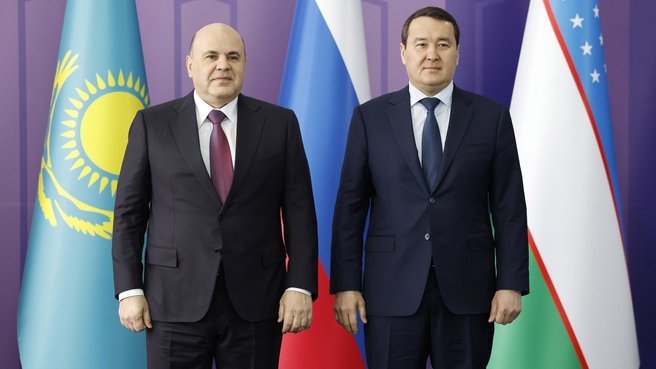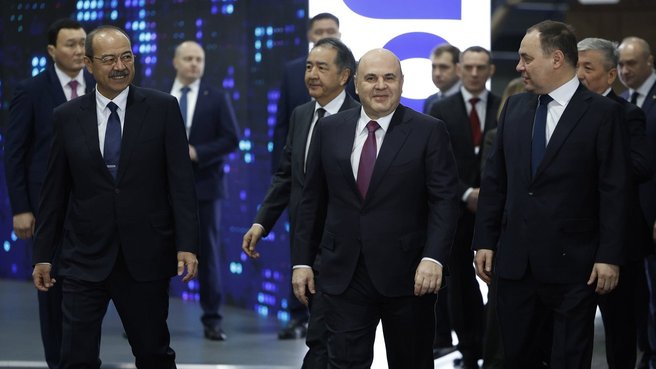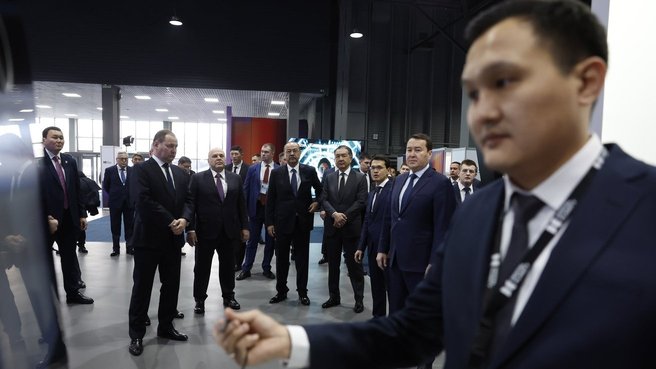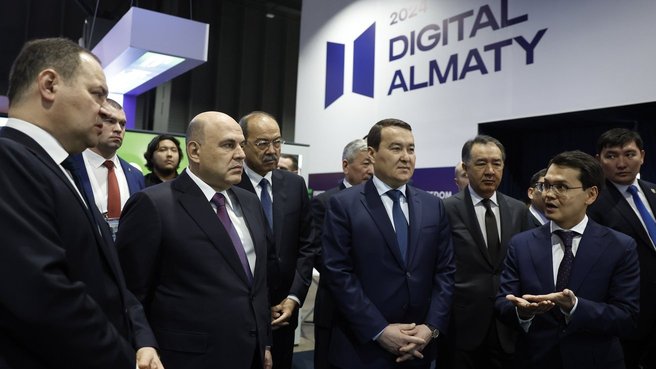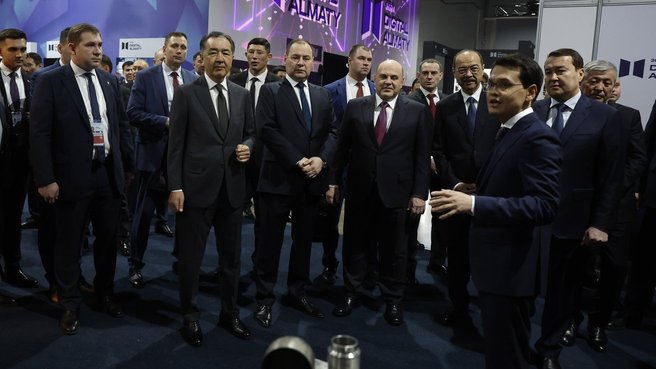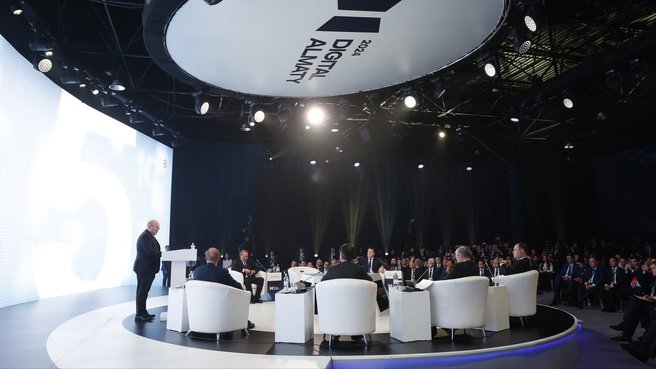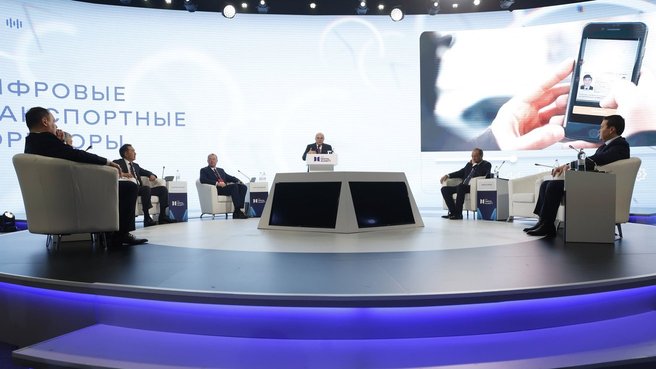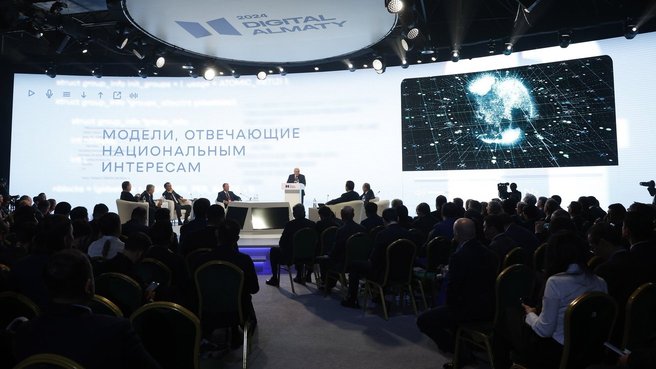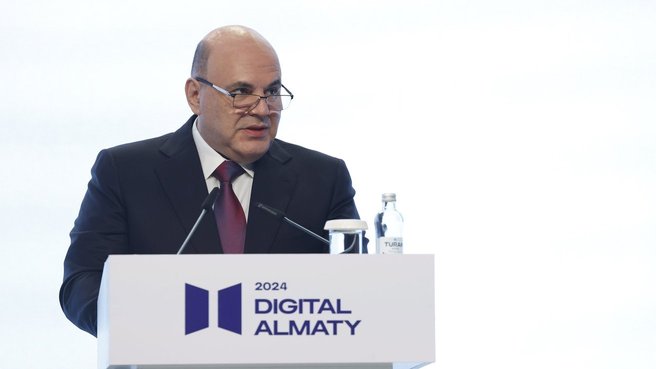The Prime Minister addressed the plenary session of the sixth international digital forum Digital Almaty 2024 titled Industry X: Digital Evolution of the Future and attended a ceremony of presenting Digital Almaty Awards.
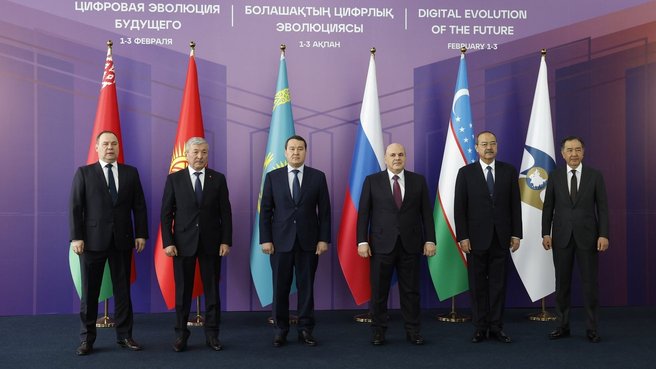
Photo opportunity of the heads of delegations attending the Digital Almaty 2024 forum. Prime Minister of Belarus Roman Golovchenko, First Deputy Prime Minister of Kyrgyzstan Adylbek Kasymaliyev, Prime Minister of Kazakhstan Alihan Smailov, Prime Minister of Russia Mikhail Mishustin, Prime Minister of Uzbekistan Abdulla Aripov, and Chairman of the Board of the Eurasian Economic Commission Bakytzhan Sagintayev
Photo opportunity of the heads of delegations attending the Digital Almaty 2024 forum. Prime Minister of Belarus Roman Golovchenko, First Deputy Prime Minister of Kyrgyzstan Adylbek Kasymaliyev, Prime Minister of Kazakhstan Alihan Smailov, Prime Minister of Russia Mikhail Mishustin, Prime Minister of Uzbekistan Abdulla Aripov, and Chairman of the Board of the Eurasian Economic Commission Bakytzhan Sagintayev
Before the session, Mikhail Mishustin and the heads of other delegations attending the forum visited an exhibition of digital projects.
The annual international digital forum Digital Almaty was first held in 2018 and is a major CIS event in the sphere of innovative technologies, attended by businesspeople, IT professionals, government officials, journalists and international experts.
The forum is held to discuss the digital agenda at the regional and global levels and to exchange experience in digital transformation. The focus is on the development of human capital and the creative industries, the use of robot technologies, and the digitisation of industries, healthcare and education.
The theme of the 2024 forum, scheduled for 1–3 February, is Industry X: Digital Evolution of the Future. The forum will be attended by about 30,000 delegates from various companies, with 200 guest speakers, including international experts, industry leaders, delegates from innovative IT and commercial companies, representatives of technology parks from Russia, Belarus, Kyrgyzstan, Uzbekistan, Iran, India and China, government officials from SCO and EAEU countries, as well as experts and businesspeople. They will discuss modern digital trends, the use of digital technologies for dealing with social, economic and environmental issues, as well as positive examples of the use of novel technologies in the real economy and innovations sector.
Mikhail Mishustin’s remarks:
Dear colleagues and forum participants,
First of all, I would like to thank hospitable Kazakhstan, the President of Kazakhstan, esteemed Kassym-Jomart Tokayev, and Prime Minister Alihan Smailov for the excellent arrangements made for the forum. This has already become a traditional event, and it gives us an opportunity to coordinate our positions, as regards the development of integration processes in the field of innovations and digitisation and to chart future joint steps for our development.
Unfortunately, our colleague, the Prime Minister of Kyrgyzstan Akylbek Japarov, is not taking part in the current forum, due to an accident at a thermal power plant in Bishkek. We hope that the situation at that power plant will be rectified in the near future. Russia, as well as probably all other colleagues, are ready to help in dealing with this accident.
Colleagues,
President of Russia Vladimir Putin has repeatedly noted the importance of intensifying interaction between the five countries in the field of digital transformation and IT development. He has noted that our states should introduce modern technologies and solutions, including those in the field of economic activity, in line with common principles and approaches.
Together, we have repeatedly discussed the increasing significance of big data volumes, as well as the more active use of AI systems. While visiting the exhibition today, we saw a lot of AI apps. Roman Golovchenko discussed this in great detail, while making his remarks.
Speaking here several years ago, I drew your attention to the fact that countries lacking these technologies ran the risk of becoming dependent, information-wise, politically and economically, while acquiring foreign-made inventions. This issue is becoming more topical nowadays. Experts are saying that technological leaders will exercise more control over critical infrastructure systems.
We already have a successful track record in launching joint initiatives in the union. We are developing digital transport corridors and using an integrated information platform. There are more and more projects like this.
At the same time, it is important to take global trends into account. I would like to briefly highlight five of them now.
The first is the growing shift to local production. Today, local industries are crucial for states in order to guarantee the availability of goods, raw materials and technologies to households and businesses. Moreover, the ongoing re-industrialisation of developed economies relies on support for the full life cycle of products, the creation of digital twins of items, facilities and processes – their virtual prototypes. They open up new opportunities for testing and simulation and greatly expand the future application of such solutions.
The second is the need to ensure reliable supply chains and related logistics. Along with promoting local manufacturing, conditions need to be created for new industrial cooperation projects, primarily with friendly countries. Speaking of which, we reached a respective agreement in the Eurasian Economic Union last year.
Third, we need to develop payment alternatives for the international financial system. The existing ones fail to take into account the interests of all participants – in fact a very large proportion of them. To ensure everyone’s interests are respected, the system needs to support mutual payments in national currencies and independent payment instruments. Such solutions already exist, they are widespread and popular – I am referring to distributed ledger services.
The fourth trend is the inextricable link between accelerated technological progress and digital development. Technological advancement is impossible without the introduction of platform solutions, strengthening cyber defences, generative artificial intelligence and many other innovations.
I said last year, I think, that the capitalisation of the 20 largest companies in the world was growing largely thanks to the introduction of platform solutions – digital platforms connecting customers with suppliers of goods and services bypassing (or trying to bypass) regulators to cut costs and accordingly boost profits – rather than because of the introduction of advanced new technologies proper.
The fifth trend has to do with building integrated public administration systems. They are a strategic resource for making important decisions in the field of socioeconomic development, based on the most reliable, direct information (because these systems are platform solutions) and user feedback.
Russia prioritises all these areas. We are one of the three world leaders possessing considerable competence in digital technologies.
Among other things, their use is helping us to respond to difficult challenges, both internal and external. Russia’s GDP dynamics also testifies to this fact. According to preliminary estimates, GDP growth in 2023 was 3.5 percent – and quite likely even 4 percent – as stated by President Putin, despite the very real sanctions pressure. This is higher than the world average and higher than the performance of advanced countries in Europe, if we judge by the tentative figures the World Bank published in January.
Our industrial production figures are pretty good, particularly in the manufacturing industry and construction industry. Unemployment is at a record low level. Why am I saying this? We have digitalised and platformatised state administration processes, something that helped us achieve this result.
Currently, we are focusing on further development, including, importantly, on launching technological sovereignty megaprojects, intensifying the effort to train engineering teams, and introducing digital technologies.
The megaprojects will make it possible to increase the output of high-priority products in a number of crucial sectors, from tool-making and aircraft-building to the electronics industry and pharmaceuticals.
To provide industries with home-made industrial and system-wide software, we have coordinated the efforts of customers, developers and the federal executive agencies within the framework of related competence centres. We have created 34 of these centres.
We are developing a network of world-level student campuses with an eye to improving the quality of personnel training in Russia. Currently, there are 17 campuses and President of Russia Vladimir Putin has instructed us to bring that number to 25 by 2030. These will offer all possible comforts and broad opportunities for getting a profession and conducting research. Technological teams from EAEU countries could also be trained on these platforms, and I think that this should be done.
As for digital solutions, we continue introducing them in all spheres, including those based on artificial intelligence. We discussed this in detail at the exhibition earlier today. Over the last two years, the use of AI in Russia’s economic sectors and state administration has increased by 50 percent (we measure this). The economic effect has amounted to over 1 trillion roubles and is set to exceed 10 trillion roubles by the end of this decade, something that will add almost 6 percent to the GDP figures.
At this point, I would like to dwell on some ethical matters. Of course, the way artificial intelligence works, or thinks, depends on the datasets it was trained on, which in turn reflect the specific nature of its country of origin. AI absorbs information people feed it.
Therefore, Russia’s GigaChat and Western AI solutions, in particular, ChatGPT have different worldviews. They differ in their understanding of good and bad. If we are to allow AI to be used in critical sectors such as research, healthcare and manufacturing, it is essential that we use models which are consistent with universal human values. It goes without saying that they must serve our national interests too. This is something that matters to us.
We also focus on digital transformation in public administration by developing a state-run cloud ecosystem for all our agencies and regions, as well as experts. Just like similar international solutions, it offers its users platform-based services for operating information systems.
Today, we also use one-size-fits-all solutions to create services for specific agencies. This was quite a long road for us, but now we can assemble information systems in the manner of a construction kit and use IoT solutions.
There are other examples too. We have been transitioning to major platforms based on the state automated management and e-budgeting system in recent years. There are also solutions to improve the transparency of public administration and regulation. You know many of these solutions already.
The Russian public services portal has been expanding its offering in order to improve the user experience for our people. Year after year, I have been seeing progress in the use of applications and public services systems, in particular in Kazakhstan. I would like to congratulate our colleagues on their outstanding results. We saw this progress once again today. In Russia, we have a public services portal with over 100 million users, offering almost 300 million services every year.
Building on all these solutions, Russia has positioned itself as a leading nation in terms of introducing basic online government systems, the so-called e-government, during these challenging times, as confirmed by the World Bank’s ranking measuring the digital transformation of governments. We will further improve all the solutions we have.
Colleagues, friends,
In late 2023, the heads of our five countries signed a declaration on long-term economic development within the union, titled the Eurasian Economic Path. It emphasises the importance of digital transformation within our shared space. This is a very important element in upgrading and retooling our five economies.
Russia stands ready to share its approaches and specific technological and platform-based solutions with its partners. I must emphasise that they must be shielded from the outside world and operate as a closed circuit, which means that it is a must and simply a duty for each of our countries to preserve sovereignty over their data. We can share services, and platform cores – nothing more. I think that we need home-grown reliable solutions of this kind.
We have a tradition of discussing the applied solutions I mentioned today at the Digital Industry of Industrial Russia conference in Nizhny Novgorod. This year, it will take place in May. I invite our distinguished colleagues and everyone who is interested in these matters to come to Nizhny Novgorod in order to get a closer look at what our country has achieved in this sector. The topic of this year’s conference coincides with that of this Digital Almaty expo. We will be discussing the digital transformation in manufacturing.
Friends,
The development of the Eurasian Economic Union will largely depend on whether we stand united and are able to come up with prompt and effective responses to all the developments, shifts and challenges, and whether we can introduce digital solutions in all sectors, be it public administration, social affairs, or economic sectors. Let’s work together on this agenda and walk the road to success and achievement together.
